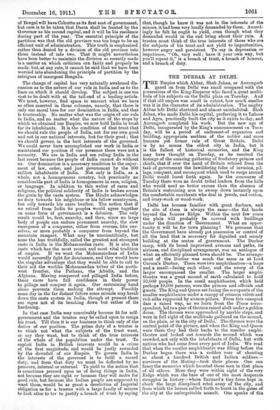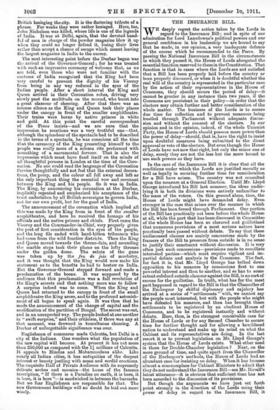Tab DITRBAR AT DELHI. T HE Empire which Akbar, Shah Jaha.n,
or Aurungzeb gazed on from Delhi was small compared with the possessions of the King-Emperor who faced a great multi- tude of his subjects on the Delhi plain on Tuesday. And if that old empire was small in extent, how much smaller was it in the character of its administration. The mighty Akbar left Delhi shattered and almost uninhabited. Shah Jahan, who made Delhi his capital, preferring it to Lahore and Agra, practically built the city as it exists to-day, and Aurungzeb completed his work. But the new age of Delhi, inaugurated by the King's announcement on Tues- day, will be a period of undreamt-of expansion and building, appropriate emblem of the nobler and more humane yet firmer rule of Great Britain. Delhi is by no means the oldest city in India, but it is the fullest of historical memories, and the King may have thought on Tuesday, as he received the homage of the amazing gathering of feudatory princes and chiefs, that if ever the hand of Britain relaxed from the task of government the bewildering tides of invasion, pil- lage, conquest, and reconquest which used to surge around Delhi would burst forth again. In the concourse of Tuesday there were no doubt tribal leaders from the hills who would need no better excuse than the absence of Britain's restraining arm to swoop down instantly upon the comfortable merchants who deal in jewels, and cotton, and ivory-work or wood-work.
Delhi has become familiar with great durbars, and the site of them is always the same—the flat lands beyond the famous Ridge. Within the next few years the plain will probably be covered with buildings under the direction of Government. What an oppor- tunity it will be for town planning! We presume that the Government have already got possession or control of all the land that is necessary for dignified and seemly building at the centre of government. The Durbar camp, with its broad improvised avenues and paths, its airiness, and disciplined arrangement, was an analogue of what an efficiently planned town should be. The arrange- ment of the Durbar was much the same as at Lord Curzon's Durbar. There were two amphitheatres—a large and a small—facing each other, and the sweep of the larger encompassed the smaller. The larger amphi- theatre was a great mound of earth calculated to hold 50,000 people. In the small amphitheatre, which held perhaps 10,000 persons, were the princes and officials and guests. The King and Queen sat facing the occupants of the smaller amphitheatre under a canopy of crimson velvet and rich silks supported by sixteen pillars. From this canopied dais a raised way, as we learn from the Times corre- spondent, led to a pair of thrones raised aloft under a golden dome. The thrones were approached by marble steps, and were in full sight of the multitude gathered on the mound, on the plain, or in the city of Delhi. The thrones were the central point of the picture, and when the King and Queen were there they had. their backs to the smaller amphi- theatre and looked out towards the mound which was crowded, not only with the inhabitants of Delhi, but with natives who had come from every part of India. We read that when the smaller amphitheatre was filling before the Durbar began there was a sudden roar of shouting as about a hundred British and Indian soldiers— survivors of the Mutiny—took their places. One can fancy the memories which haunted these men in that place of all others. Here they were within sight of the very Ridge which was the base of one of the most desperate struggles in history—where Barnard's tiny force kept in check the large disciplined rebel army of the city, and from which the heroes sallied forth to burst in the gates of the city at the unforgettable assault. One speaks of the British besieging the city. It is the flattering tribute of a phrase. For weeks they were rather besieged. Here, too, John Nicholson was killed, whose life is one of the legends of India. It was at Delhi, again, that the devoted hand- fsl of men in charge of the powder magazine blew it up w hen they could no longer defend it, losing their lives rather than accept a chance of escape which meant leaving the largest magazine in India. to the enemy.
The next interesting point before the Durbar began was the arrival of the Governor-General ; for he was treated with such an impressive ceremony of welcome that, as we are told, even those who were not familiar with the customs of India recognized that the King had been very careful to prevent the dignity of his Viceroy from being in any way reduced in the eyes of the Indian people. After a short interval the King and Queen arrived in their Coronation robes, driving very slowly past the multitude on the mound, who burst into a great clamour of cheering. After that there was an intense silence as the King and Queen took their places under the canopy in front of the smaller amphitheatre. Their trains were borne by native princes in white and gold. At this point the careful correspondent of the Times insists—and, we are sure that the impression he mentions was a very truthful one—that, although the splendour of the spectacle had to be described in the terms of a spectacle, he was conscious all the time that the ceremony of the King presenting himself to the people was really more of a solemn rite performed with something of a sacramental fervour. That is also the impression which must have fixed itself on the minds of all thoughtful persons in London at the time of the Coro- nation. No one could read the language of the Coronation service thoughtfully and not feel that the external decora- tions, the pomp, and the colour all fell away and left as the only important thing the essential vow and covenant between the King and his people. So it was in India. The King, by announcing his coronation at the Durbar, implicitly repeated and emphasized his acceptance of the trust undertaken by all British sovereigns to govern India, not for our own profit, but for the good of India.
The announcement of the coronation which implied all this was made by the King from in front of the smaller amphitheatre, and here he received the homage of his officials and the native princes and chiefs. First came the Viceroy and the Commander-in-Chief, very properly given the post of first consideration in the eyes of the people, and the long file ended with hard-bitten tribesmen who had come from the wild frontier districts. Then the King and Queen moved towards the throne-dais, and ascending file marble steps took their places on the lofty thrones under the golden dome. The salute of the guns was taken up by the feu de joie of musketry, and it was thought that the King would now make his statement as to the benefits he had to bestow on India. But the Governor-General stepped forward and made a proclamation of the boons. It was supposed by the audience that this proclamation was a full revelation of the King's secrets and that nothing more was to follow A surprise indeed was to come. When the King and Queen had returned to the canopy in front of the small amphitheatre the King arose, and to the profound astonish- ment of all began to speak again. It was then that he made the announcement of the change of capital and the modification of the partition of Bengal. The secret was out, and in an unexpected way. The people looked at one another " swift surprise," and their criticism, if there was any at that moment, was drowned in tumultuous cheering. A Durbar of unforgettable significance was over.
Englishmen of commerce made Calcutta, but Delhi is a city of the Indians. One wonders what the population of the new capital will become. At present it has not more than 250,000 as compared with the 11 millions of Calcutta. It appeals to Hindus and Mohammedans alike. Like nearly all Indian cities, it has antiquities of the deepest interest or beauty jostling with mean and sordid erections. The exquisite Hall of Private Audience with its supremely delicate arches and mosaics—the home of the famous inscription, "If there is a Paradise on earth, it is here, it is here, it is here "—is sandwiched in between the barracks. But we fear Englishmen are responsible for that. The new Government buildings will no doubt be laid out more wisely.



















































 Previous page
Previous page